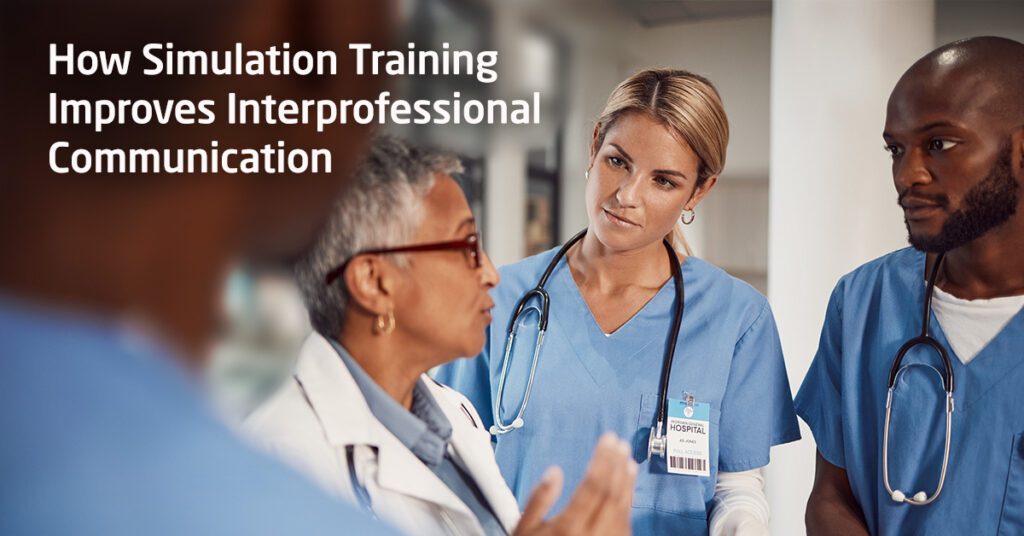It’s been well established that strong interprofessional collaboration and communication within healthcare teams lead to better patient and provider outcomes.
This translates to greater patient care, reduced rates of morbidity and mortality, and increased satisfaction. On the provider side, it means lower stress levels, decreased workloads, and improved employee retention.
Despite its obvious importance, healthcare providers nationwide need help facilitating strong interprofessional communication and collaboration. The solution is multidisciplinary healthcare simulation training.
Breaking Down the Barriers to Multidisciplinary Care
Rising costs, drug and personnel shortages, employee burnout and mental health concerns, patient safety and satisfaction, and increasingly sophisticated cybersecurity threats all pose severe risks to the U.S. healthcare system.
Addressing many of these challenges requires multidisciplinary care teams to communicate and collaborate effectively, particularly in high-pressure situations where every second counts.
Unfortunately, this is easier said than done. A significant barrier is the siloed nature of healthcare education and practice itself. Because different professionals are trained separately, practitioners often lack understanding and appreciation for each other’s roles and contributions. This separation can result in miscommunication, inefficiency, and even conflicts among team members, ultimately affecting patient care.
Further exacerbating these issues is the hierarchical nature of healthcare institutions, in which the opinions and insights of certain professionals are prioritized over others. This can lead to a culture where collaboration and innovation are stifled, and team-based solutions are discouraged.
Additionally, the fast-paced and high-pressure healthcare environment can further limit opportunities for team members to engage in meaningful discussions about patient care, share knowledge, and develop mutual respect and trust.
The Role of Healthcare Simulation Training
Modern healthcare simulation training emerges as a powerful solution for overcoming these barriers.
By replicating real-life scenarios in a controlled and safe environment, simulation training allows healthcare professionals across various disciplines to come together, interact, and collaborate to solve complex clinical problems.
Through scenarios that mimic actual patient cases, participants experience firsthand the necessity of clear communication, teamwork, and shared decision-making in achieving positive patient outcomes. These simulated experiences highlight the gaps in interprofessional collaboration and provide a unique opportunity for healthcare professionals to practice and refine their skills and approach to communication and collaboration without the risk of harming actual patients.
Beyond providing a safe setting to practice even the most complex scenarios, healthcare simulation technology also affords participants the opportunity to:
- Review and reflect on their actions
- Discuss what went well and what could be improved
- Learn from each other’s perspectives
By providing a forum in which all participants’ input is shared and valued, post-simulation debriefs can be instrumental in breaking down hierarchical barriers within the care setting.
Clinical simulations bridge the gap between theory and practice, transforming traditionally siloed healthcare practices into a more cohesive, multidisciplinary approach. This shift results in greater efficiency and efficacy of care, which in turn significantly improves patient outcomes.
5 Benefits of Cross-Discipline Simulation Training in Healthcare
Well-implemented multidisciplinary clinical simulations are a powerful tool for healthcare providers, enabling them to equip their care teams with the confidence, skills, knowledge, and experience needed to deliver outstanding outcomes.
1. Provide a Deeper Understanding of Different Roles
Simulation training enables healthcare professionals to reflect on their actions as a team in stress-free debrief sessions and experience the responsibilities and challenges faced by colleagues working in other disciplines via role-swapping exercises. By promoting an in-depth understanding of each team member’s contributions, healthcare simulation can help enhance communication and the ability to work cohesively under pressure.
2. Experience Complex Clinical Situations in a Safe Setting
Ultra-realistic clinical simulations provide a unique opportunity to work through high-stakes scenarios without the risk to actual patients. These simulations prepare teams to practice critical decision-making and teamwork in a controlled environment where mistakes can be turned into valuable learning moments.
3. Foster Mutual Respect and Trust
Collaborating in simulated healthcare scenarios builds a sense of teamwork and respect among team members. In facing challenges together, simulation training enables participants to recognize each others’ vital roles, strengthening the foundation of mutual respect and psychological safety required for effective interprofessional collaboration.
4. Drive Better Patient Outcomes
Studies indicate that better communication in healthcare results in improved patient outcomes, safety, and satisfaction. Likewise, teams trained in multidisciplinary simulation scenarios communicate better and make fewer errors, underscoring the link between simulation-based interprofessional education and greater care.
5. Improve Employee Retention
Across professions, people working in collaborative environments feel more motivated, engaged, supported, and productive, all of which can go a long way toward mitigating feelings of burnout. And not just that. By facilitating strong working relationships and breaking down silos, team members feel a greater sense of loyalty and are more open to seeking solutions to workplace issues that might otherwise lead to attrition.
Better Healthcare Simulation Technology for Better Interprofessional Outcomes
As healthcare continues to evolve, the role of simulation training in breaking down the barriers to multidisciplinary care will be invaluable in paving the way for more collaborative, patient-centered care that yields better outcomes.
Education Management Solutions (EMS) offers healthcare institutions cutting-edge simulation management solutions designed to help them facilitate better interprofessional communication and collaboration and provide more rigorous training in less time.
Schedule a call to discuss how EMS can help you build simulation training solutions tailored to your organization’s needs.

